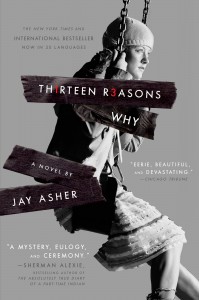 Due to the success of the Netflix adaptation of Jay Asher’s young adult novel Thirteen Reasons Why, the novel has faced increased scrutiny nationwide. American Library Association director James LaRue recently addressed the attempts to censor the popular novel.
Due to the success of the Netflix adaptation of Jay Asher’s young adult novel Thirteen Reasons Why, the novel has faced increased scrutiny nationwide. American Library Association director James LaRue recently addressed the attempts to censor the popular novel.
In the past few weeks, Thirteen Reasons Why has been banned from an elementary school in Florida and an entire school district in Colorado, despite the fact that no parents had formally challenged it in either case. School administrators in numerous districts have also cautioned parents about the Netfliz show, urging them to either watch and discuss it with their teens or to shield their teens from it altogether if they might be suicidal.
The book examines teen suicide, but Asher’s novel is more nuanced and introspective than the Netflix series. Thirteen Reasons Why is not only widely popular among teens, but also critically praised and listed in a host of “best of” lists, including the ALA’s Best Books for Young Adults and Quick Picks for Reluctant Young Adult Readers.
“There are a lot of people that are terribly afraid when something like this comes out,” LaRue told Huffington Post’s Katherine Brooks, but he emphasized that “When someone comes in and complains about a book, what should happen is not that the book is immediately withdrawn.”
Many of the reported removals of Thirteen Reasons Why have been in absence of an official challenge and in violation of school review policies. “I would urge schools to follow their policies and procedures, rather than have this reflexive attempt to halt discussion of other important issues,” LaRue said.
LaRue pointed out that “people have been writing about suicide because it happens. It doesn’t happen because people write about it.” His conclusion is validated by studies that don’t support “suicide contagion,” the idea that fictional depictions of suicide actually increase the risk of self-harm among media consumers. In fact, some suicide prevention advocates feel that Thirteen Reasons Why is more likely to spur at-risk teens to open up and seek help.
“The popularity of the series might really save lives,” concludes LaRue, “and so might more reading and talking about the issue. But silence won’t help us at all, and censorship is never the answer.”
Help support CBLDF’s important First Amendment work in 2017 by visiting the Rewards Zone, making a donation, or becoming a member of CBLDF!